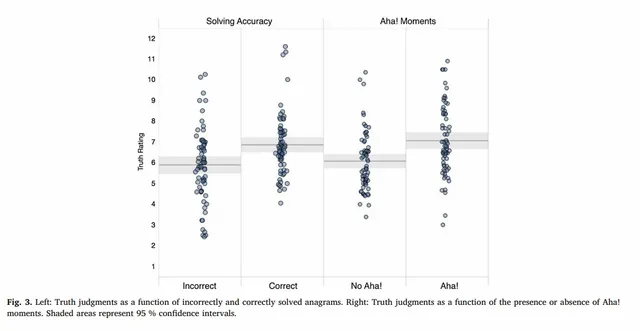The feeling of insight makes things feel true?
(cross-posted from my Substack)
The feeling of insight makes things feel true?
An idea from a psychology paper about artificially induced "Aha moments"
I was reading a popular-press article about an academic paper that discusses how the subjective feeling of achieving insight might be relevant to conspiracy theories, and it referenced an interesting psychology experiment that might have some game design applications.
The dark side of Eureka: Artificially induced Aha moments make facts feel true
by Laukkonena, Kaveladzeb, Tangenc, and Schooler
The idea behind the experiment is that our minds seem to use our subjective experience of achieving insight — an Aha! moment — as a guide to believing the thing is true, like when you figure out the solution to a mystery. The experiment posits that the aha moment doesn’t have to come directly from the “fact”, if you could simply have it happen at the same time then it should have a similar effect. The way they manipulated this experimentally is to present trivia factoids (some true and some false) with one of the words anagram-scrambled, and the subject unscrambles it before giving their judgment of whether the statement is true or false. For example “ithlium is the lightest of all metals” (lithium). They find that people gave the statements higher truth ratings when they successfully unscrambled the anagram.

The sense of getting things to “feel true” seems like it could be relevant to TTRPG design, since something seeming true is one of the best ways to get someone to agree to something. Remember the Lumpley Principle: System (including but not limited to 'the rules') is defined as the means by which the group agrees to imagined events during play. You don’t need someone with Monster Lore Authority to declare that unicorns have four legs to get players to agree to that, people already think that’s true. Maybe this technique, or variations, could be used to help grease the mentals skids to get people to have other things feel true in a way that’s useful for a game.
The immediate application that springs to mind is in games where a GM presents clues to the players. For example, presenting clues with anagram-scrambled NPC names could be a way to do situations where the players know that their characters’ memories have been psychically tampered with — the effect of realizing the NPC is the solution of the anagram could be resonant with the “wait, that’s the guy!” effect of the suppressed memory popping into clarity. Or maybe present dream imagery in a Cthulhu game that works as a rebus.
Sprinkling in anagrams might also be useful as a way to jumpstart investment in character goals when those are given to players rather than player-created, maybe in a Larp scenario or something like that. Rather than facts about lithium seeming true it would be what you need to accomplish during the scenario seeming true.
The effect size doesn’t seem huge, and there’s a chance it will seem silly or gimmicky[1] in play if used as overtly as the anagram unscrambling task, but it seemed like an interesting result with potential applications for TTRPG design so I thought I would post about it.
[1] Personally, I think we lost something when the “gimmicky” era of Story Games faded. Sure, sometimes it was done to excess, but some of them had a charm that many contemporary games seem to lack.